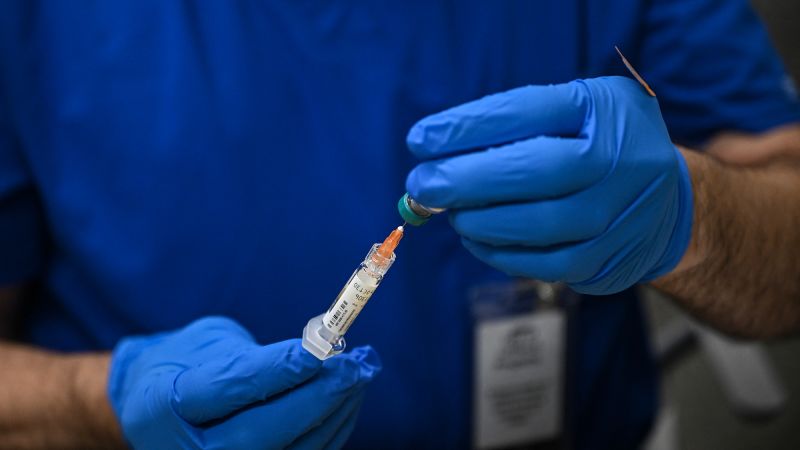### The Urgency of Vaccination Amid Record Measles Cases
Vaccination has been a cornerstone of public health, safeguarding the well-being of both individuals and communities. Recent reports reveal a worrying trend with measles cases in the United States surging to unprecedented levels—marking the highest number of cases since the disease was declared eliminated in 2000. This spike can be attributed primarily to declining childhood vaccination rates observed over the past few years, as outlined in reports from the U.S. Centers for Disease Control and Prevention (CDC). Vaccination coverage for diseases such as measles, mumps, rubella, chickenpox, polio, and pertussis has faltered in over 30 states, leading to a potential public health crisis.
The implications of falling vaccination rates extend beyond mere statistics; they raise critical questions about individual and collective immunity. Some individuals may mistakenly believe that their personal vaccination status is sufficient for protection against outbreaks of contagious illnesses. However, with increasing cases, it is evident that individual immunity is not a safeguard against the resurgence of diseases previously thought to be under control. Understanding how decreasing vaccination rates can potentially lead to the return of these diseases is imperative not only for children but for adults as well.
To delve into these concerns, healthcare expert Dr. Leana Wen, an emergency physician and clinical associate professor at George Washington University, provided valuable insights. Wen highlighted how a decline in vaccination can lead to outbreaks, recalling instances from around the globe where countries that were once free from polio saw the re-emergence of the disease due to decreased immunization efforts. Presently, Texas is seeing a troubling number of measles cases attributed predominantly to communities with low vaccination uptake, with instances of hospitalization and even fatalities reported among children.
Projected consequences of further declines in vaccination rates are stark. A recently published study in the Journal of the American Medical Association (JAMA) suggested that a mere 10% drop in measles-mumps-rubella (MMR) vaccination coverage could lead to more than 11 million measles infections over 25 years. Worse yet, a 50% decrease in routine childhood vaccinations could result in an alarming 51 million measles cases along with millions of other serious health issues. The potential repercussions on public health cannot be understated; lives are at stake, with projections estimating hundreds of thousands could face hospitalization and severe complications.
While some may assume vaccination creates an impermeable barrier against infection, experts emphasize the necessity of addressing concerns surrounding collective immunity. Dr. Wen pointed out that even vaccinated individuals should remain vigilant. Not all vaccines offer 100% protection, and breakthrough infections can occur. For example, while two doses of the MMR vaccine confer a 97% efficacy against measles, this leaves room for infection when outbreaks occur. Moreover, vaccine efficacy can diminish over time, particularly regarding illnesses like whooping cough, wherein adults previously vaccinated may become susceptible again.
A notable segment of the population that remains vulnerable includes those unable to be vaccinated due to medical conditions or who rely on herd immunity to protect them. This group includes individuals with weakened immune systems and pregnant people, who are often unable to receive live vaccines like MMR due to the risks they pose to fetal health. Diseases like rubella, if contracted during pregnancy, can lead to severe consequences, including congenital defects such as heart issues and other health complications.
So, if immunity wanes and vaccination rates continue to dip, who bears the brunt of the consequences? Dr. Wen identified three particularly at-risk groups: newborns who are too young to be vaccinated, immunocompromised individuals who may not respond well to vaccines or lack access to them altogether, and the elderly, whose age often necessitates heightened caution against infectious diseases.
Addressing the growing concern of declining vaccination rates begins with individual accountability. Health experts stress the importance of consulting with healthcare providers to ensure vaccinations are current, particularly for parents of young children. In order to safeguard oneself and the larger community, individuals must remain informed about their vaccination status and consider booster doses where necessary. Vaccination is not merely a personal choice; it is a collective responsibility that influences the health of everyone, particularly those who are most vulnerable.
In conclusion, the alarming rise in measles cases underscores the critical need for increased vaccination efforts nationwide. As individuals band together to ensure robust immunization coverage, we can protect our communities from unnecessary outbreaks and safeguard the health of the most vulnerable among us. The message is clear; vaccination is not just an individual shield; it is also a communal defense against the resurgence of preventable diseases.












